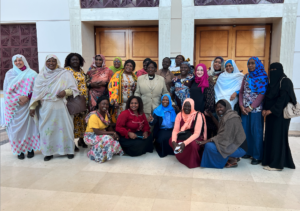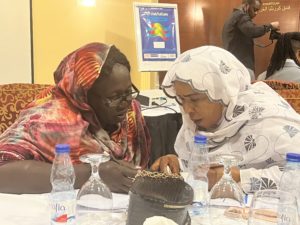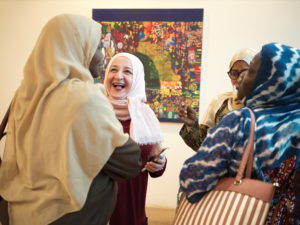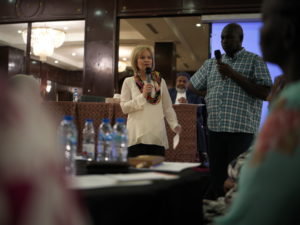By Hurunnessa Fariad, Director of Outreach
Multi-Faith Neighbors Network went to Sudan to facilitate a clergy retreat in Khartoum, Sudan. The retreat included Imams and pastors but what made this retreat historic is the inclusion of Muslim and Christian women! I journaled my experience to share how impactful our work with the Sudanese women was during the retreat and how these women are going to work together to address issues in Sudan!
The plane to Khartoum landed late Monday night. It was a pleasantly cool and clear night as we drove to the hotel. I was looking out the window and I immediately felt like I was home. There was some kind of familiar connection I had with a country I’d never visited before, a language I did not speak, and people I’d never met before. The smiles were bright and sincere. Everyone greeted me with salaamalaikum (peace be upon you) and no one was staring at my headscarf. In Sudan, I was part of the majority.
 Our retreat started after lunch the next day. We expected 13 imams and 13 pastors and 20 Muslim and Christian women to participate. I was nervous, yet excited to meet the women. Being an extrovert helped me in my work but not speaking Arabic was making me feel a bit incomplete, even though we did have translators who were a great help. As the first few women walked in, I noticed that the majority were wearing headscarves and I assumed they were all Muslim. They wore beautiful vibrant colors, various textures, and styles, definitely expressing their connection to their Sudanese culture. I soon learned that even many Christian women wear the headscarf, which is normal in Sudanese culture. I observed their eyes wandering around the room, not knowing what to expect. Some women wore traditional Sudanese outfits, others wore western clothes, and some were a mix of both. One woman even wore a niqab (face covering).
Our retreat started after lunch the next day. We expected 13 imams and 13 pastors and 20 Muslim and Christian women to participate. I was nervous, yet excited to meet the women. Being an extrovert helped me in my work but not speaking Arabic was making me feel a bit incomplete, even though we did have translators who were a great help. As the first few women walked in, I noticed that the majority were wearing headscarves and I assumed they were all Muslim. They wore beautiful vibrant colors, various textures, and styles, definitely expressing their connection to their Sudanese culture. I soon learned that even many Christian women wear the headscarf, which is normal in Sudanese culture. I observed their eyes wandering around the room, not knowing what to expect. Some women wore traditional Sudanese outfits, others wore western clothes, and some were a mix of both. One woman even wore a niqab (face covering).
We had three tables designated for the women in the front of the room next to the men’s tables. The women were to partner up in groups of two, one Christian woman and one Muslim woman and they had to live in close proximity to each other. As we waited for the other clerics and women to show up, the women and the men already in the room started to talk to each other with greetings and introductions. I noticed the women were talking more than the men. They were engaged in back-and-forth conversations which made me feel good that they weren’t being shy with one another. We then had them fill out a pre-retreat survey.
I was seated at the first table of Christian and Muslim women. One Christian woman spoke English and I kept her close to me to help me translate. As the ladies were filling out their surveys, I noticed a Muslim woman was helping a Christian woman who did not know how to read or write in Arabic. I watched them intently and saw the smiles, grace, and support they had for one another. There was no mocking, belittling, or embarrassment emanating from their interaction. I saw another Christian woman read for a Muslim woman who did not have her glasses with her.
A Christian woman, Niki Roberts, was at another table of women. Niki has this warm, calm, and inviting demeanor that quickly captures the hearts of anyone she meets. Niki started her group in Dallas, Texas called Embrace, over 13 years ago. Christian, Muslim, and Jewish women who have established relationships from visiting each other’s homes to celebrating the births of newborns and collectively mourning the loss and the passing of their loved ones. Niki’s experience and wisdom working with the women of Dallas helped our retreat immensely. All the Sudanese women wanted to take pictures with Niki and appreciated her wholeheartedly. I was personally elated that Niki was in Sudan with me. The Sudanese women were paying attention to Niki and me interacting which also helped them to feel comfortable with everyone else. When Pastor Bob and Imam Magid asked a question, the women were usually the first to raise their hands. They would clap loudly for each other and encourage each other throughout the day.
We were working with a Sudanese woman by the name of Dr. Insaf Ibrahim Hag-Mousa. Insaf and I hit it off right away. Her bright contagious smile made it easy to talk to her, and her years of experience working in the gulf and holding highly prestigious positions made her an unstoppable force. She joined us at the retreat to help with connecting with the locals and explaining concepts from English to Arabic. When she talked, the whole room would intently listen. Everyone who knew Insaf highly respected her and yet she is a humble woman.
That evening, we all went to eat dinner at a restaurant by the Nile river. There was excitement and a collective calm around the women. The women were invited to the buffet first which was full of mouth-watering appetizers, salads, and staple meat dishes from Sudan and the United States. The dessert table was full of delicious Sudanese and Arab sweets. After dinner, we all had coffee and tea on the huge balcony overlooking the Nile river. It was a cool brisk evening, but with all the laughter and clicks of cameras, everyone felt warm and included. I did not see one person sitting by themselves throughout the night. I sat with a group of women explaining what they have been trying to do in their communities to Imam Magid in Arabic and he translated for me. I watched their smiles, heard the enthusiasm in their voices, traced their struggles with their hand movements, and felt their disappointment and frustration when explaining their obstacles.
The pastors and imams were engaging in conversations with the women as well. They were laughing, and enjoying their time away from the everyday cycle of life and were able to focus on building meaningful relationships with each other. Whenever a pastor and imam found the Christian and Muslim women from their area, they made sure they made a connection and exchanged contact information.
 The second day was intense. The women, pastors, and imams express what they felt about their own insecurities and the way other faiths perceived them. The women took the conversation to another level. They were able to express their feelings, especially the Christian women. This prompted one Muslim woman to admit (paraphrasing), “I did not know that my Christian sisters felt this way. I don’t want them to feel that their voices don’t count because they are a minority. This awareness has made me want to change how I have been doing this so far.” I personally felt the pain in the Muslim woman’s voice. From her heart, she was able to feel the pain of her Christian Sudanese sisters. Her voice cracked a few times, yet she was able to hold in her tears. It was during these honest and deep conversations that allowed the Christians to say what they have experienced as religious minorities in Sudan.
The second day was intense. The women, pastors, and imams express what they felt about their own insecurities and the way other faiths perceived them. The women took the conversation to another level. They were able to express their feelings, especially the Christian women. This prompted one Muslim woman to admit (paraphrasing), “I did not know that my Christian sisters felt this way. I don’t want them to feel that their voices don’t count because they are a minority. This awareness has made me want to change how I have been doing this so far.” I personally felt the pain in the Muslim woman’s voice. From her heart, she was able to feel the pain of her Christian Sudanese sisters. Her voice cracked a few times, yet she was able to hold in her tears. It was during these honest and deep conversations that allowed the Christians to say what they have experienced as religious minorities in Sudan.
Some of the Christian women wore different clothes on the second day. Many of the Christian women wore their headscarves on their shoulders and one even wore her suit and clerical collar. When I saw her, I ran to her and hugged her. I was relieved that she felt safe the second day to show who she really is. Had she not felt safe, we would have never known she was a cleric. Her posture and demeanor now demanded respect.
On the third day, we were aiming to start at 9:00 a.m. By 8:30 a.m., there were about 10 women and three men already in the room waiting for the session to start. A few minutes before 9:00 a.m., one of the women gave me a bag and said this is a gift for you from all the women. I wasn’t expecting a gift from them but the necklace, bracelet, and earring set they gave me became very dear to me. Dear because they gave it to me as a collective group, one group of Sudanese women.
Each pair of clerics and women had 5 minutes to present their project with timelines and details to the entire room. The women presented first. They were articulate and understood this assignment. They mentioned how eager they are to work with the clerics on their projects together. There were bonds created from this retreat which moved the women to a different level. Their new friendships with the clerics allowed the women to feel the importance of their participation. The women now felt heard and knew they had people to help them during their projects to bring their projects to fruition.
 When the retreat ended, everyone gathered in the hallway for coffee, tea, and snacks. There was vigor in the air as everyone was chatting, smiling, and taking pictures. Business cards being exchanged and a lifetime of relationships built to move Sudan to the next level by the Sudanese people.
When the retreat ended, everyone gathered in the hallway for coffee, tea, and snacks. There was vigor in the air as everyone was chatting, smiling, and taking pictures. Business cards being exchanged and a lifetime of relationships built to move Sudan to the next level by the Sudanese people.
I learned so much from these women but my greatest takeaway is that no matter where in the world we go to do our work, whether they are Christian, Muslim, or Jewish, women want to be part of the conversation, are comfortable in expressing their grievances and their love and that women will always have the backs of their fellow sisters!
